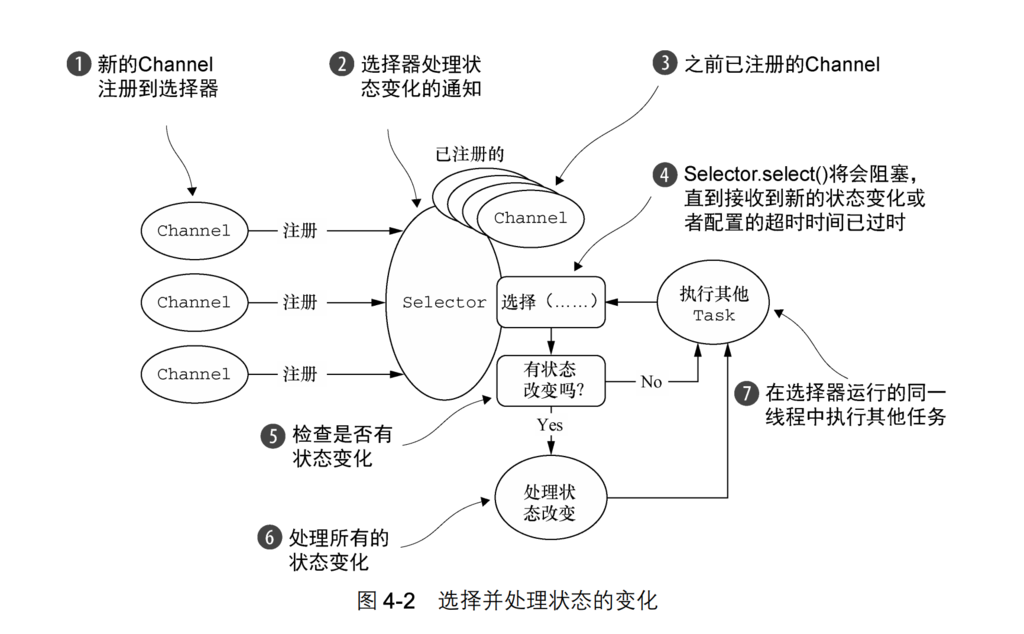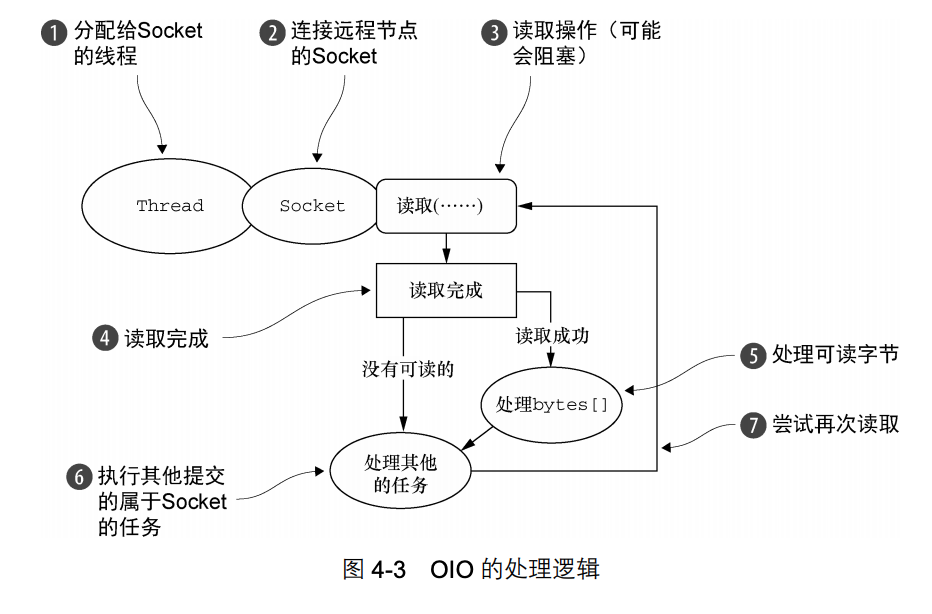Java原生阻塞IO
public class PlainOioServer {
public void serve(int port) throws IOException {
final ServerSocket socket = new ServerSocket(port);
try {
for(;;) {
final Socket clientSocket = socket.accept();
System.out.println(
"Accepted connection from " + clientSocket);
new Thread(new Runnable() {
@Override
public void run() {
OutputStream out;
try {
out = clientSocket.getOutputStream();
out.write("Hi!
".getBytes(
Charset.forName("UTF-8")));
out.flush();
clientSocket.close();
} catch (IOException e) {
e.printStackTrace();
} finally {
try {
clientSocket.close();
} catch (IOException ex) {
// ignore on close
}
}
}
}).start();
}
} catch (IOException e) {
e.printStackTrace();
}
}
}
Java原生NIO
nio:选择并处理状态的变化

public class PlainNioServer {
public void serve(int port) throws IOException {
ServerSocketChannel serverChannel = ServerSocketChannel.open();
serverChannel.configureBlocking(false);
ServerSocket ss = serverChannel.socket();
InetSocketAddress address = new InetSocketAddress(port);
ss.bind(address);
Selector selector = Selector.open();
serverChannel.register(selector, SelectionKey.OP_ACCEPT);
final ByteBuffer msg = ByteBuffer.wrap("Hi!
".getBytes());
for (;;){
try {
selector.select();
} catch (IOException ex) {
ex.printStackTrace();
//handle exception
break;
}
Set<SelectionKey> readyKeys = selector.selectedKeys();
Iterator<SelectionKey> iterator = readyKeys.iterator();
while (iterator.hasNext()) {
SelectionKey key = iterator.next();
iterator.remove();
try {
if (key.isAcceptable()) {
ServerSocketChannel server =
(ServerSocketChannel) key.channel();
SocketChannel client = server.accept();
client.configureBlocking(false);
client.register(selector, SelectionKey.OP_WRITE |
SelectionKey.OP_READ, msg.duplicate());
System.out.println(
"Accepted connection from " + client);
}
if (key.isWritable()) {
SocketChannel client =
(SocketChannel) key.channel();
ByteBuffer buffer =
(ByteBuffer) key.attachment();
while (buffer.hasRemaining()) {
if (client.write(buffer) == 0) {
break;
}
}
client.close();
}
} catch (IOException ex) {
key.cancel();
try {
key.channel().close();
} catch (IOException cex) {
// ignore on close
}
}
}
}
}
}
只有NIO和Epoll支持零拷贝

- 针对于Linux,自Linux内核版本 2.5.44后,引入epoll——一个高度可扩展的I/O事件通知特性,提供了比旧的POSIX select和poll系统调用更好的性能,Linux JDK NIO API使用了这些epoll调用
用法简单,只需要将NioEventLoopGroup替换为EpollEventGroup,并且把NioServerSocketChannel.class替换为EpollServerSocketChannel.class即可。
String os = System.getProperty("os.name");
if(os.toLowerCase().startsWith("win")){
System.out.println(os + " can't gunzip");
}
Netty实现阻塞IO
OIO的处理逻辑

public class NettyOioServer {
public void server(int port)
throws Exception {
final ByteBuf buf =
Unpooled.unreleasableBuffer(Unpooled.copiedBuffer("Hi!
", Charset.forName("UTF-8")));
EventLoopGroup group = new OioEventLoopGroup();
try {
ServerBootstrap b = new ServerBootstrap();
b.group(group)
.channel(OioServerSocketChannel.class)
.localAddress(new InetSocketAddress(port))
.childHandler(new ChannelInitializer<SocketChannel>() {
@Override
public void initChannel(SocketChannel ch)
throws Exception {
ch.pipeline().addLast(
new ChannelInboundHandlerAdapter() {
@Override
public void channelActive(
ChannelHandlerContext ctx)
throws Exception {
ctx.writeAndFlush(buf.duplicate())
.addListener(
ChannelFutureListener.CLOSE);
}
});
}
});
ChannelFuture f = b.bind().sync();
f.channel().closeFuture().sync();
} finally {
group.shutdownGracefully().sync();
}
}
}
Netty实现NIO
public class NettyNioServer {
public void server(int port) throws Exception {
final ByteBuf buf =
Unpooled.unreleasableBuffer(Unpooled.copiedBuffer("Hi!
",
Charset.forName("UTF-8")));
NioEventLoopGroup group = new NioEventLoopGroup();
try {
ServerBootstrap b = new ServerBootstrap();
b.group(group).channel(NioServerSocketChannel.class)
.localAddress(new InetSocketAddress(port))
.childHandler(new ChannelInitializer<SocketChannel>() {
@Override
public void initChannel(SocketChannel ch)
throws Exception {
ch.pipeline().addLast(
new ChannelInboundHandlerAdapter() {
@Override
public void channelActive(
ChannelHandlerContext ctx) throws Exception {
ctx.writeAndFlush(buf.duplicate())
.addListener(
ChannelFutureListener.CLOSE);
}
});
}
}
);
ChannelFuture f = b.bind().sync();
f.channel().closeFuture().sync();
} finally {
group.shutdownGracefully().sync();
}
}
}